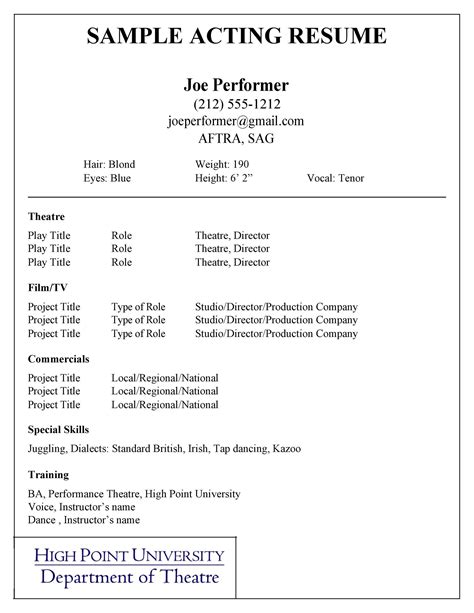Acting and theatre professionals often struggle to create a comprehensive resume that showcases their diverse skills and experiences. A well-crafted theatre resume is essential for landing auditions, jobs, and opportunities in the competitive entertainment industry.
In this article, we'll discuss the importance of having a strong theatre resume, explore the key components of a successful resume, and provide a free downloadable theatre resume template in Google Docs.
Why Do You Need a Theatre Resume?
A theatre resume is a crucial tool for actors, directors, stage managers, and other theatre professionals to promote their work, skills, and experiences to potential employers, casting directors, and agents. A well-written resume helps you stand out in a crowded industry, increasing your chances of getting noticed and landing auditions or job opportunities.
Benefits of Having a Theatre Resume
- Professionalism: A theatre resume demonstrates your professionalism and commitment to your craft, showcasing your skills, training, and experience in the industry.
- Visibility: A well-crafted resume increases your visibility, making it easier for casting directors, agents, and potential employers to find and consider you for opportunities.
- Competitive Edge: A strong theatre resume gives you a competitive edge in the industry, helping you stand out from other applicants and increasing your chances of getting hired.

Key Components of a Theatre Resume
A successful theatre resume should include the following key components:
- Contact Information: Include your name, email address, phone number, and social media profiles (if relevant).
- Headshot: Attach a high-quality headshot that accurately represents your current look and age range.
- Summary/Objective: Write a brief summary or objective statement that highlights your experience, skills, and career goals.
- Training and Education: List your relevant training, education, and certifications in the performing arts.
- Performance Experience: Include a detailed list of your performance experience, including productions, roles, and venues.
- Skills: List your relevant skills, such as languages, accents, dialects, and technical skills.
- Awards and Recognition: Include any notable awards, nominations, or recognition you've received in the industry.
Additional Sections to Consider
- Directing Experience: If you're a director, include a list of your directing credits, including productions and venues.
- Stage Management Experience: If you're a stage manager, include a list of your stage management credits, including productions and venues.
- Teaching Experience: If you're a teacher or instructor, include a list of your teaching credits, including institutions and courses taught.
- Special Skills: Include any special skills you have, such as stage combat, acrobatics, or music abilities.

Free Downloadable Theatre Resume Template in Google Docs
To help you create a strong theatre resume, we're offering a free downloadable theatre resume template in Google Docs. This template is designed to help you showcase your skills, experience, and training in a clear and concise manner.
Download the Theatre Resume Template in Google Docs:
[Insert download link]
Tips for Using the Template:
- Customize the Template: Tailor the template to your specific needs and experience.
- Keep it Concise: Keep your resume concise and focused on your most relevant experience and skills.
- Use Action Verbs: Use action verbs to describe your experience and skills, such as "performed," "directed," and "managed."
- Proofread: Carefully proofread your resume for spelling, grammar, and formatting errors.
Gallery of Theatre Resume Templates





FAQs
Q: What should I include in my theatre resume? A: Your theatre resume should include your contact information, headshot, summary/objective, training and education, performance experience, skills, and any notable awards or recognition.
Q: How long should my theatre resume be? A: Your theatre resume should be no longer than one to two pages in length.
Q: Can I use a template to create my theatre resume? A: Yes, using a template can help you create a strong theatre resume. Our free downloadable theatre resume template in Google Docs can help you get started.
Q: How often should I update my theatre resume? A: You should update your theatre resume regularly to reflect any changes in your experience, skills, or training.
We hope this article has helped you understand the importance of having a strong theatre resume and provided you with the tools and resources you need to create a successful one. Remember to customize your resume to your specific needs and experience, and don't hesitate to reach out if you have any questions or need further guidance. Happy creating!
